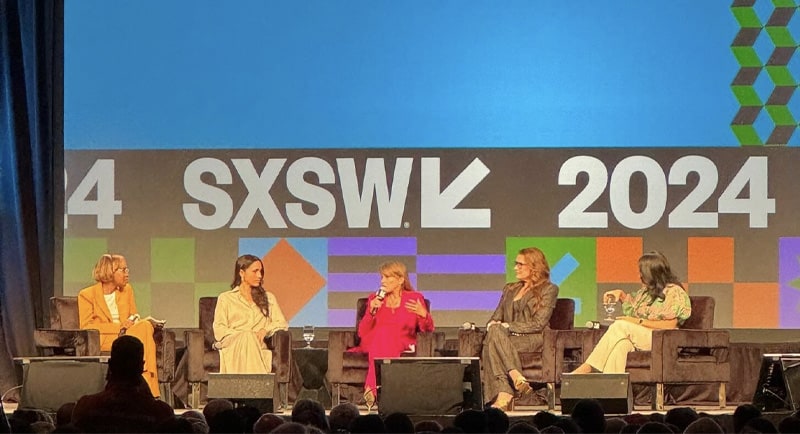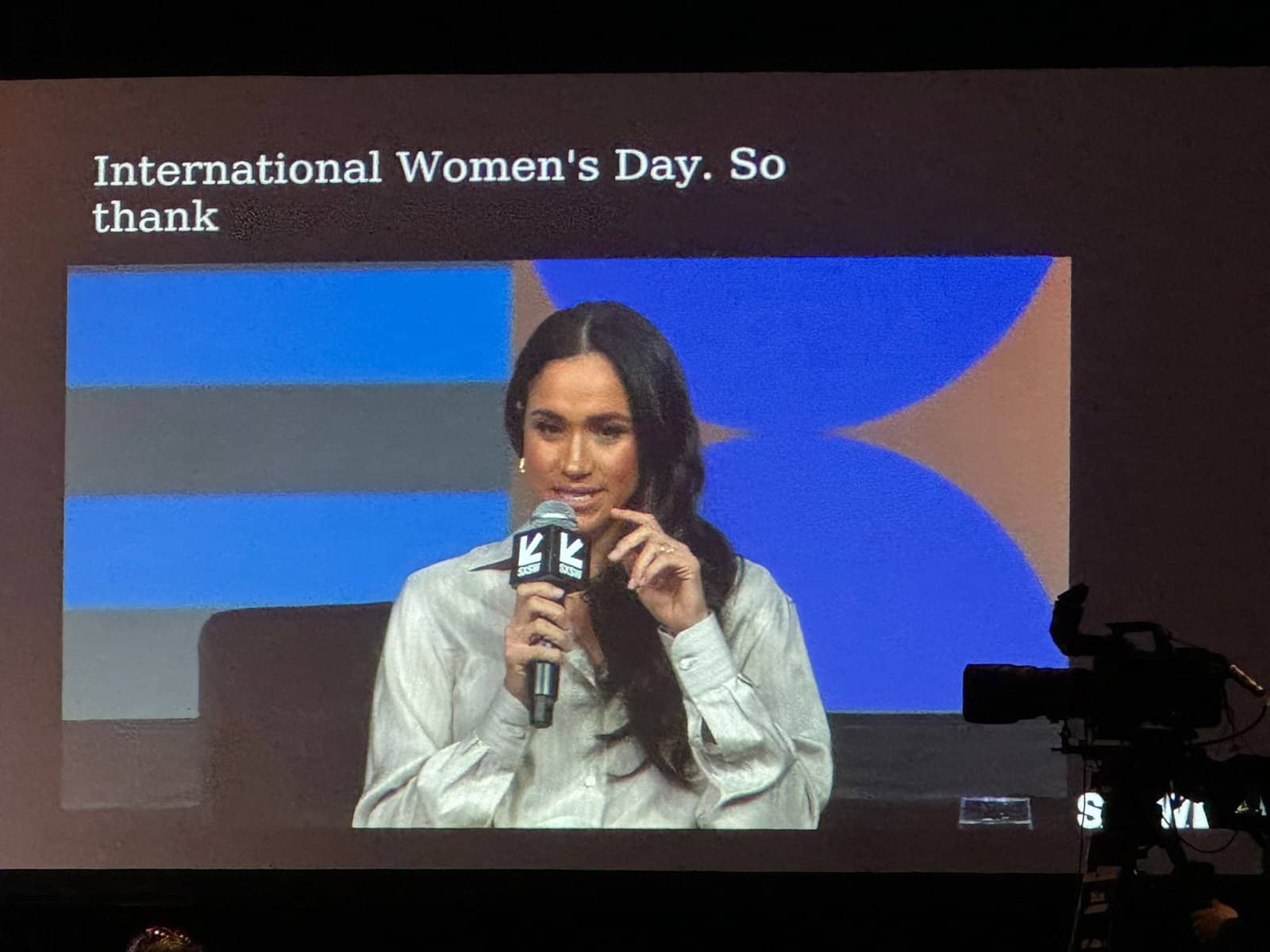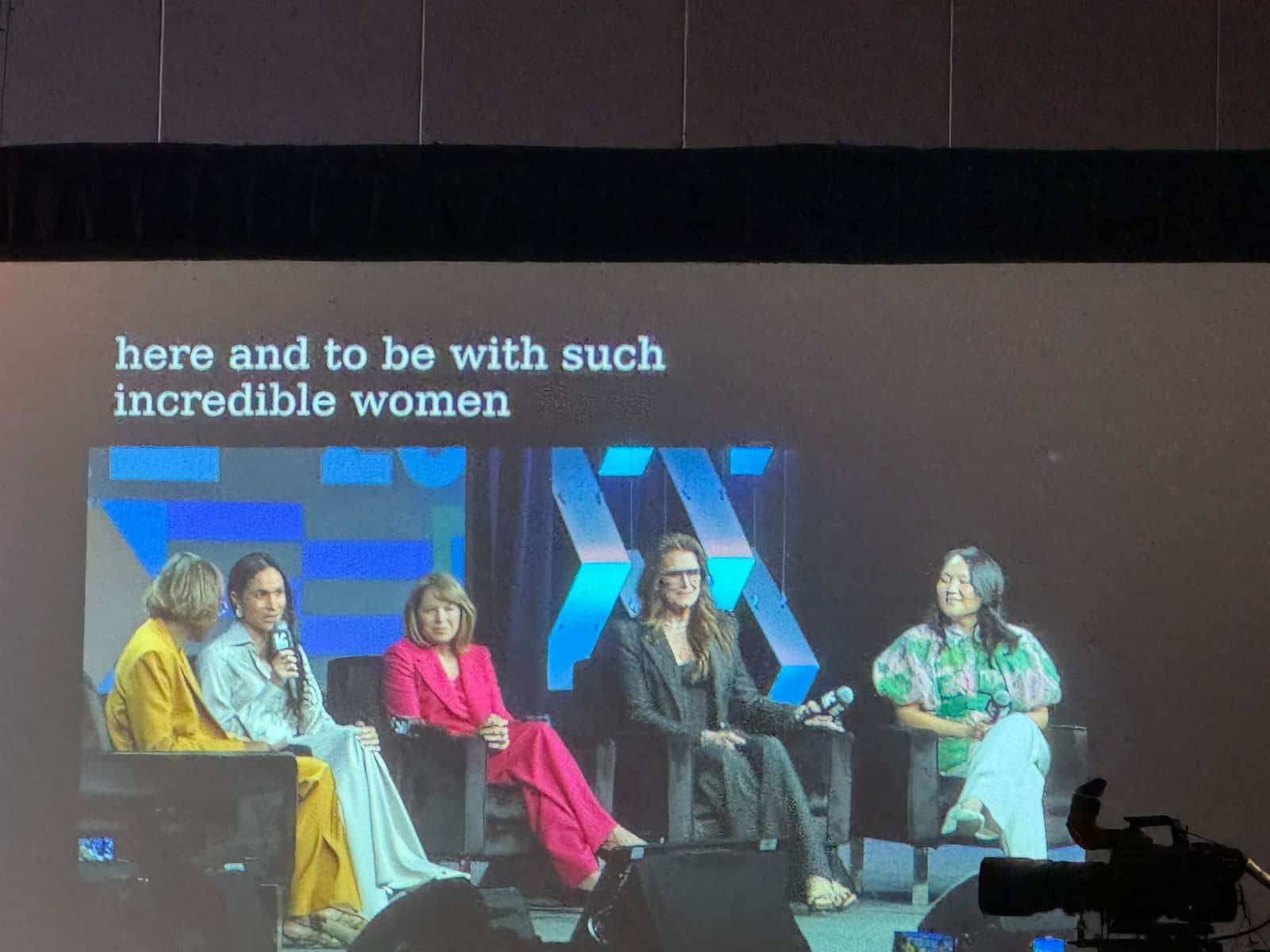Meghan Markle has urged women to believe that “your voice is not small, it just needs to be heard,” on a star-studded International Women’s Day panel at SXSW Austin.
Mediaweek was at the session called ‘Breaking Barriers, Shaping Narratives: How Women Lead On and Off the Screen’, a keynote session featuring Markle, Katie Couric, Brooke Shields, and Nancy Wang Yuen.
Couric asked Markle to tell a story from her childhood that highlighted the power of someone’s voice when heard.
“I was 11 years old, and I’d seen a commercial on TV for a dishwashing liquid. It said that women all over America are fighting greasy pots and pans and the boys in my class said ‘yeah, women belong in the kitchen’ and at 11, I just found that infuriating,” Markle said.
“I wrote lots of letters and put pen to paper and they ended up changing the commercial to people all over America. It’s funny to look back at it now because that was before social media where you had a reach that was so much greater, it was just an 11-year-old with a pen and paper.
“It goes to show that if you know that there’s something wrong and you’re using your voice to advocate in the direction of what is right, that can really land and resonate and make a huge change for a lot of people. Your voice is not small, it just needs to be heard.”
Shields quipped to laughter: “This is one of the ways that we will be different – when I was 11, I was playing a prostitute.”
Off the back of this, Shields talked about sexualising young women in America, and why it was important she confronted the issue in her recent Hulu documentary about her life, Pretty Baby: Brooke Shields.
“I was at the centre of it and I was promoting it, and I was doing it. I was lucky, because I was surrounded by a very strong mum, I never did move to Hollywood, I always went to regular school. I had this sort of community around me that was protecting me, buoying me. I did not become the type of statistic that Hollywood created, Hollywood is predicated on eating its young. It wants to build you up and then devour you.”
The group also discussed gender equality progress and the road ahead, focusing on the media’s role. Couric said she has always fought hard for strong roles for women. She joked that when she started in the newsroom, ‘harassed’ was two words instead of one.
“When I was offered the job at The Today Show, I said to Michael Gardner, who was then president of NBC News, I’ve worked in local news for six years, I’d covered the Pentagon, covered Desert Storm and all these other important stories,” Couric noted.
“I said, ‘I’m interested in this job, but only if you’ll give me a 50/50 division of labour with Bryant Gumbel. I want to do as many hard news interviews as he does, I don’t want to be relegated to cooking segments, fashion shows and celebrity interviews. I earned my stripes and that’s what I’m demanding.’
“He looked at me kind of quizzically in a bow tie and he said, ‘What about 49/51?’ And I said, ‘Okay, I’ll take it.’ Brian Gumbel insisted that he open every show, that he throw to every commercial break, that he always threw to the weatherman, who was Willard Scott at the time, and I could never do that, I think to convey the idea that he was in charge.
“I think just by making that demand, I eventually had more power and took on important jobs on The Today Show. But from the get go, I said, ‘This is how I want to be seen’, because I knew the impact this would have. The dynamics of the show, the division of labour, who was doing presidential interviews, I knew little girls were watching that getting ready for school with their moms and I wanted them to say, ‘Oh, she is just as good as he is.'”
Couric also pointed out that a large number of linear TV news executives are now women including at ABC, NBC, CBS, MSNBC, and Fox, which she said is a win. But other challenges still exist.
“We have a lot of work to do, because unfortunately, this is happening as linear television is declining in its significance. As these outlets gravitate towards streaming, I’ve looked at a picture of all the heads of the major streamers, and it’s five white guys.
“We have to tackle that and I hope that will change but when you look at digital media, it’s much worse. I think 20% of editors of the most popular international online publications are women. When it comes to podcasting, women are 50% of listeners, but men are 79% of hosts. There’s still a lot of inequities that we have to approach but we’re definitely making progress.”
Wang Yuen added that how you see yourself represented on TV is still a persisting issue.
“Moms are represented as thin, young, whites and not really working outside of the home, which is a patriarchal fantasy,” she said.
“This is not our reality, and it embraces the fact that the US out of all the wealthy countries is ranked second to last when it comes to childcare and parental leave policies. I remember when I was in grad school, that’s when I had my first baby and I found it harder to secure affordable and high quality childcare than to actually complete my PhD.
“Policy makers who are not working moms, for the most part, are the ones that are actually determining policy. We know that if they’re not actually having contact with those people, they’re deriving their ideas from television and film subconsciously, you know it’s not real but that’s what you’re seeing.”


